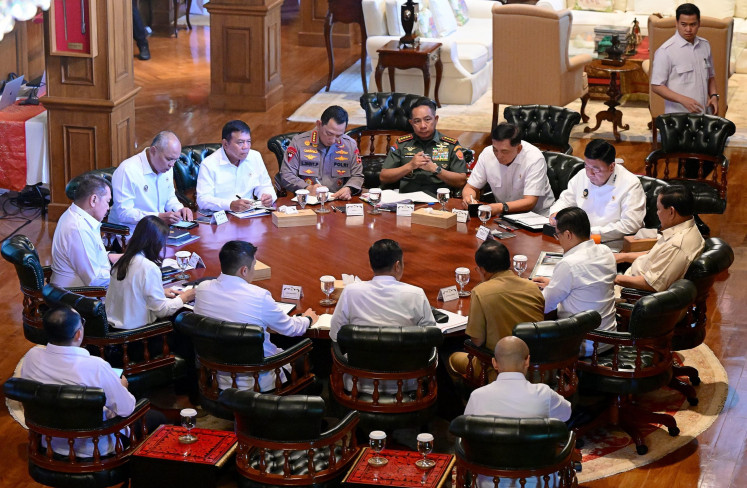Popular Reads
Top Results
Can't find what you're looking for?
View all search resultsPopular Reads
Top Results
Can't find what you're looking for?
View all search results101 super-stylist hijab
(JP/R
Change text size
Gift Premium Articles
to Anyone
![(JP/R. Berto Wedhatama)" border="0" height="341" width="512"><span class="caption" style="width: 510px;">(JP/R. Berto Wedhatama)</span></span></p><p>Wearing stylish hijab is something that you can do your own in the comfort of your own home, says talented young designer Dian Pelangi.<br><br>Before revealing her styling tips, Dian educates her audience with basic terminology popular in Islamic fashion. âTerms such as jilbab, hijab and kerudung,â she said during a talk show at the recent Jakarta Islamic Fashion Week.<br><br>Kerudung is an Indonesian word for headscarf while jilbab comes from the Arabic word jalabiya, which means long dress or caftan. Another term is hijab, which literary means the barrier or partition commonly seen in mosques to separate men and women.<br><br>â[In terms of clothing] hijab also refers to covering oneself from head to toe. The term goes further, as we also have to cover our sights, behavior and heart,â adds the 22-year-old, who prefers to use the latter term.<br><br>In that sense, Dian carefully designs in line with the basic rules of Islamic fashion, such as covering most of the body, <br>looseness and opaque material.<br><br>Further, the fashion artisan designs items that are in harmony with other.<br><br>To look fashionable, yet, modest, Dian always emphasizes the importance of expressing a personâs personality and character. <br><br>âJust stay true to who you are. Wear what you like; whatever suits your character. For example, I like colors, so my personal style is colorful, like a rainbow,â she says.<br><br>âIf you are more of an edgy girl, pick dark colors, which reflect your character and if you are calm and feminine, choose pastel colors or floral motifs.â <br><br>Dian, who graduated from ESMOD fashion school in Jakarta in 2009, always refers to three basic fashion principles. <br><br>âFirst is pattern, second is color and third is silhouette,â she says. </p><p><span class="inline inline-none"><img class="image image-_original " src="http://202.158.21.182/files/images2/sp-l6-adesigner.jpg" alt="Designer Dian Pelangi (left) gives a superstylish hijab tutorial during the recent Jakarta Islamic Fashion Week in Jakarta.(JP/Nurhayati)" title="Designer Dian Pelangi (left) gives a superstylish hijab tutorial during the recent Jakarta Islamic Fashion Week in Jakarta.(JP/Nurhayati)](https://www.thejakartapost.com/files/images2/sp-l6-hhijab2.jpg) (JP/R. Berto Wedhatama)" border="0" height="341" width="512">(JP/R. Berto Wedhatama)
(JP/R. Berto Wedhatama)" border="0" height="341" width="512">(JP/R. Berto Wedhatama)Wearing stylish hijab is something that you can do your own in the comfort of your own home, says talented young designer Dian Pelangi.
Before revealing her styling tips, Dian educates her audience with basic terminology popular in Islamic fashion. âTerms such as jilbab, hijab and kerudung,â she said during a talk show at the recent Jakarta Islamic Fashion Week.
Kerudung is an Indonesian word for headscarf while jilbab comes from the Arabic word jalabiya, which means long dress or caftan. Another term is hijab, which literary means the barrier or partition commonly seen in mosques to separate men and women.
â[In terms of clothing] hijab also refers to covering oneself from head to toe. The term goes further, as we also have to cover our sights, behavior and heart,â adds the 22-year-old, who prefers to use the latter term.
In that sense, Dian carefully designs in line with the basic rules of Islamic fashion, such as covering most of the body,
looseness and opaque material.
Further, the fashion artisan designs items that are in harmony with other.
To look fashionable, yet, modest, Dian always emphasizes the importance of expressing a personâs personality and character.
âJust stay true to who you are. Wear what you like; whatever suits your character. For example, I like colors, so my personal style is colorful, like a rainbow,â she says.
âIf you are more of an edgy girl, pick dark colors, which reflect your character and if you are calm and feminine, choose pastel colors or floral motifs.â
Dian, who graduated from ESMOD fashion school in Jakarta in 2009, always refers to three basic fashion principles.
âFirst is pattern, second is color and third is silhouette,â she says.
(JP/R. Berto Wedhatama) Wearing stylish hijab is something that you can do your own in the comfort of your own home, says talented young designer Dian Pelangi. Designer Dian Pelangi (left) gives a superstylish hijab tutorial during the recent Jakarta Islamic Fashion Week in Jakarta.(JP/Nurhayati) Tips & tricks
Before revealing her styling tips, Dian educates her audience with basic terminology popular in Islamic fashion. 'Terms such as jilbab, hijab and kerudung,' she said during a talk show at the recent Jakarta Islamic Fashion Week.
Kerudung is an Indonesian word for headscarf while jilbab comes from the Arabic word jalabiya, which means long dress or caftan. Another term is hijab, which literary means the barrier or partition commonly seen in mosques to separate men and women.
'[In terms of clothing] hijab also refers to covering oneself from head to toe. The term goes further, as we also have to cover our sights, behavior and heart,' adds the 22-year-old, who prefers to use the latter term.
In that sense, Dian carefully designs in line with the basic rules of Islamic fashion, such as covering most of the body,
looseness and opaque material.
Further, the fashion artisan designs items that are in harmony with other.
To look fashionable, yet, modest, Dian always emphasizes the importance of expressing a person's personality and character.
'Just stay true to who you are. Wear what you like; whatever suits your character. For example, I like colors, so my personal style is colorful, like a rainbow,' she says.
'If you are more of an edgy girl, pick dark colors, which reflect your character and if you are calm and feminine, choose pastel colors or floral motifs.'
Dian, who graduated from ESMOD fashion school in Jakarta in 2009, always refers to three basic fashion principles.
'First is pattern, second is color and third is silhouette,' she says.
'If the pattern of your top has caught attention, pick a calmer one for your bottom. When you wear a bright-colored top, mix it with a softer bottom piece. And, if your top has a wide silhouette, choose a slimmer cut for below,' she added. 'Therefore, you'll get a harmonious look.'
Fabrics are also another essential factor.
'If you pick the wrong fabric, you'll feel hot and sweaty, which isn't comfortable at all,' says Dian.
Cotton and jersey are most suitable fabrics for daily use, while materials that flow ' like chiffon, silk and rayon challis ' are appropriate for party dresses.
Another part of the atelier that is important for Dian is the headscarf. She suggests the use of minimal pins for safety reason.
'Lesser pins will also make easier for us to get wudhu [ablution] for daily prayers,' she says.
As a solution, Dian provides six headscarf styles using two of her own specially designed scarves. The styles requires a ninja (inner part of headscarf which looks like ninja mask but does not hide the facial area) layer and two variation scarves ' in rectangle and square shapes ' with gradation motifs.
She illustrates her scarves on a model dressed in an unadorned baby green top and tie-dyed skirt. With the rectangle-shaped scarf, Dian starts with an Arab style ' popularized by fashion designer and blogger Dina Toki-o of Britain.
In less than two minutes, the styling, which applies one twirl and two pins, is ready.
Dian then used another part of the same headscarf from the first style, but on this occasion focuses on covering front torso area.
For the third style, still using the same scarf, she forms a turban, which is perfect for a party. Although the look may be looked a bit complicated, styling takes less than three minutes and uses one twirl and a pin.
Using the square scarf, Dian started the style without folding it into triangle shape ' as most Indonesian women do ' instead, treating the square scarf like a long scarf.
In the fifth styling, Dian folded the square scarf into triangle shape before coming up with another beautiful style which used three pins.
'You need good fabric to get great drapery effect with this styling,' she says.
The final styling is another turban form that applies a bundle on top of the head.
Fashion designer Dian Pelangi top tips:
'¢Pick the most subtle color from your colorful top or bottom for you headscarf
'¢Choose a large pattern if you have a slim figure to create volume and avoid dark colors
'¢Smaller patterns are good for those who carry weight ' also avoid pastel colors
'¢Select pants or skirts with an
accent color that draws attention and avoid flat footwear
'¢High waist skirts or pants are perfect for those who are vertically challenged
'¢Be confident
Your Opinion Matters
Share your experiences, suggestions, and any issues you've encountered on The Jakarta Post. We're here to listen.
Thank You
Thank you for sharing your thoughts. We appreciate your feedback.
Share options
Quickly share this news with your network—keep everyone informed with just a single click!
Gift Premium Articles
to Anyone
Share the best of The Jakarta Post with friends, family, or colleagues. As a subscriber, you can gift 3 to 5 articles each month that anyone can read—no subscription needed!
Continue in the app
Get the best experience—faster access, exclusive features, and a seamless way to stay updated.









